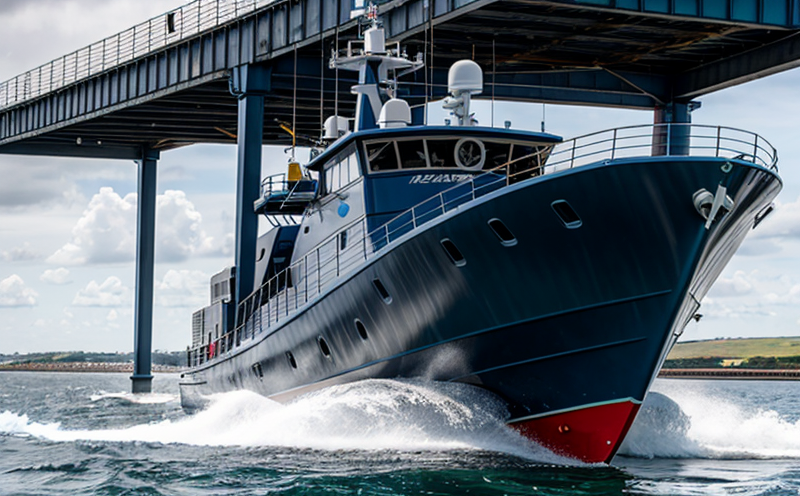ISO 30461 Propulsion Endurance Testing under Load
The ISO 30461 standard is a critical benchmark for ensuring that marine engines and propulsion systems can meet stringent durability and performance requirements. This test evaluates the endurance of propulsion systems by simulating real-world operating conditions, including load, speed, and environmental factors such as temperature fluctuations and corrosion.
Understanding the context of this test requires recognizing its importance in maintaining ship safety and compliance with international maritime regulations. The standard applies to a wide range of marine engines used across various types of vessels, from commercial freighters to high-speed passenger ships. By subjecting propulsion systems to prolonged periods of operation under controlled load conditions, ISO 30461 helps ensure that these critical components can withstand the rigors of long-term service.
The testing process involves several key steps. First, the propulsion system is assembled and calibrated according to manufacturer specifications. Next, it undergoes a series of endurance tests where it operates continuously under specified load conditions for extended periods—typically up to 100 hours or more. During this time, performance metrics such as fuel consumption, emissions levels, noise output, and mechanical integrity are monitored closely.
One critical aspect of ISO 30461 testing is the use of realistic operating profiles that mimic actual vessel operations. This ensures that any potential issues are identified before deployment in service. The test setup often includes sophisticated instrumentation capable of measuring minute changes in performance parameters, providing detailed insights into how the propulsion system behaves under stress.
Another important consideration is the environment within which these tests take place. To accurately replicate real-world conditions, the testing facility must be equipped with climate control systems to simulate varying temperatures and humidity levels. Additionally, facilities may use salt spray chambers or other methods to test for corrosion resistance—an essential factor given the harsh marine environment.
The results of ISO 30461 testing are crucial not only for ensuring compliance with international standards but also for improving product design and performance. Manufacturers can use this data to identify areas where improvements are needed, leading to more reliable and efficient propulsion systems. For end-users, such as ship operators or naval architects, these tests provide peace of mind knowing that their equipment has been thoroughly tested and validated according to global best practices.
In summary, ISO 30461 Propulsion Endurance Testing under Load plays a vital role in safeguarding the integrity of marine propulsion systems. By subjecting them to rigorous testing conditions, this process helps ensure that these critical components perform reliably over extended periods, thereby enhancing safety and efficiency across the maritime industry.
Benefits
- Elevates product reliability through extensive endurance evaluation under real-world loads
- Achieves compliance with international standards like ISO 30461, ensuring regulatory adherence
- Promotes continuous improvement in engine design and manufacturing processes
- Enhances safety by identifying potential weaknesses early in the development stage
- Reduces maintenance costs and extends service life of propulsion systems
- Improves fuel efficiency and reduces environmental impact through optimized performance tuning
- Fosters innovation by providing detailed insights into system behavior under various conditions
Why Choose This Test
- Comprehensive Evaluation: ISO 30461 testing provides a holistic view of propulsion system performance, covering multiple aspects including durability, efficiency, and emissions.
- Realistic Conditions: The test simulates actual operational scenarios, ensuring that the results are directly applicable to real-world use cases.
- Regulatory Compliance: By adhering to ISO standards, manufacturers can demonstrate their commitment to quality and safety, meeting stringent industry requirements.
- Enhanced Reliability: Prolonged testing under controlled conditions helps uncover latent defects that might otherwise go unnoticed during shorter tests.
- Innovation Facilitation: Detailed performance data enables engineers to refine designs and introduce new technologies.
- Cost Savings: Early detection of issues minimizes the need for extensive repairs or replacements post-deployment, saving significant costs over time.
Environmental and Sustainability Contributions
The ISO 30461 testing process not only enhances product performance but also plays a role in promoting sustainability within the maritime sector. By ensuring that propulsion systems operate efficiently and produce minimal emissions, this test contributes to reducing the environmental footprint of ships.
One key benefit is reduced fuel consumption, which directly translates to lower CO2 emissions. Efficient engines consume less fuel per unit distance traveled, helping to minimize greenhouse gas emissions from the shipping industry—a major contributor to global pollution levels.
In addition to emission reductions, ISO 30461 testing promotes resource efficiency by optimizing engine performance. This leads to longer operational lifespans for propulsion systems, reducing waste associated with premature failures and replacements. Moreover, more durable components mean less frequent maintenance requirements, further contributing to overall sustainability efforts.
The use of advanced materials and manufacturing techniques also benefits from ISO 30461 testing. Engineers can identify which materials perform best under prolonged stress conditions, guiding future developments towards greener alternatives. For instance, lighter alloys or composite materials might be chosen if they offer both durability and weight savings—a win-win scenario for performance and environmental impact.
Finally, the standard supports the transition toward cleaner energy sources by encouraging innovation in propulsion technology. As regulations become stricter regarding pollutant outputs, shipbuilders are motivated to explore alternative fuels like liquefied natural gas (LNG) or hydrogen-powered engines. ISO 30461 testing ensures that these new technologies meet rigorous performance standards, paving the way for a greener future in maritime transportation.





